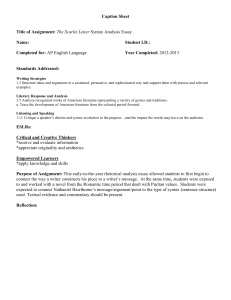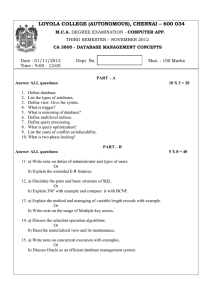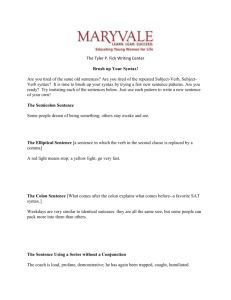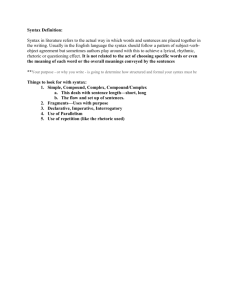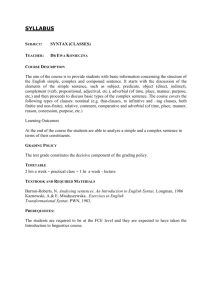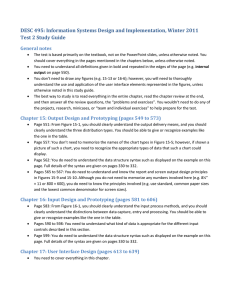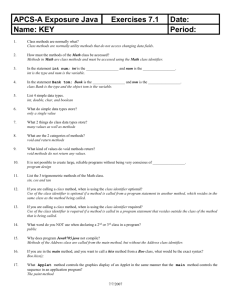CMPS C++ Reference Chart (2008.02.28) 1
advertisement
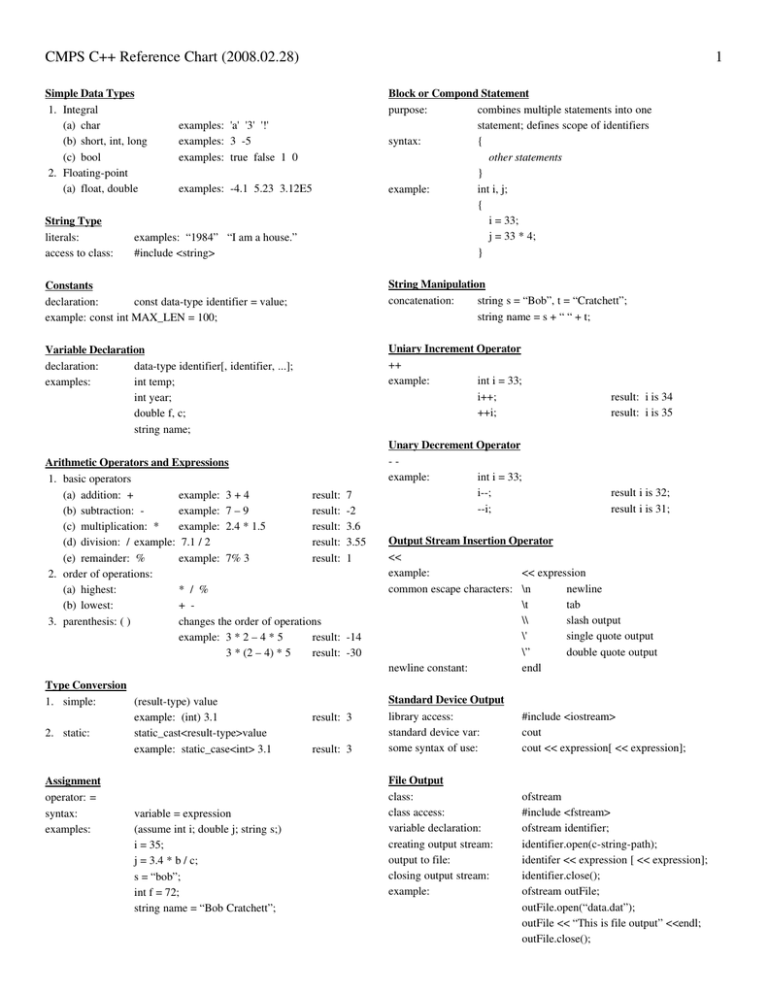
CMPS C++ Reference Chart (2008.02.28)
Simple Data Types
1. Integral
(a) char (b) short, int, long
(c) bool
2. Floating­point
(a) float, double
String Type
literals:
access to class:
1
Block or Compond Statement
purpose:
combines multiple statements into one statement; defines scope of identifiers
syntax:
{
other statements
}
example:
int i, j;
{
i = 33;
j = 33 * 4;
}
examples: 'a' '3' '!'
examples: 3 ­5
examples: true false 1 0
examples: ­4.1 5.23 3.12E5
examples: “1984” “I am a house.”
#include <string>
Constants
declaration:
const data­type identifier = value;
example: const int MAX_LEN = 100;
String Manipulation
concatenation:
string s = “Bob”, t = “Cratchett”;
string name = s + “ “ + t;
Variable Declaration
declaration:
data­type identifier[, identifier, ...];
examples:
int temp; int year;
double f, c;
string name;
Uniary Increment Operator
++ example:
int i = 33;
i++;
++i;
result: i is 34
result: i is 35
Unary Decrement Operator
­ ­
example:
int i = 33;
i­­;
­­i;
result i is 32;
result i is 31;
Arithmetic Operators and Expressions
1. basic operators
(a) addition: +
example: 3 + 4
result: 7
(b) subtraction: ­
example: 7 – 9
result: ­2
(c) multiplication: *
example: 2.4 * 1.5
result: 3.6 (d) division: / example: 7.1 / 2
result: 3.55
(e) remainder: %
example: 7% 3
result: 1
2. order of operations:
(a) highest:
* / %
(b) lowest:
+ ­
3. parenthesis: ( ) changes the order of operations
example: 3 * 2 – 4 * 5
result: ­14
3 * (2 – 4) * 5
result: ­30
Type Conversion
1. simple:
(result­type) value
example: (int) 3.1
2. static:
static_cast<result­type>value
example: static_case<int> 3.1 Assignment
operator: =
syntax:
examples:
variable = expression
(assume int i; double j; string s;)
i = 35;
j = 3.4 * b / c;
s = “bob”;
int f = 72;
string name = “Bob Cratchett”;
result: 3
result: 3
Output Stream Insertion Operator
<<
example:
<< expression
common escape characters: \n
newline
\t
tab
\\
slash output
\'
single quote output
\”
double quote output
newline constant:
endl
Standard Device Output
library access:
standard device var:
some syntax of use:
File Output
class:
class access:
variable declaration:
creating output stream:
output to file:
closing output stream:
example:
#include <iostream>
cout
cout << expression[ << expression];
ofstream
#include <fstream>
ofstream identifier;
identifier.open(c­string­path);
identifer << expression [ << expression];
identifier.close();
ofstream outFile;
outFile.open(“data.dat”);
outFile << “This is file output” <<endl;
outFile.close();
CMPS C++ Reference Chart (2008.02.28)
Input Stream Extraction Operator
>>
reads from stream to white­space
example:
>> variable
Standard Device Input
library declaration:
standard device var:
some syntax of use:
File Input
class:
class access:
variable declaration:
creating input stream:
input from file:
closing input stream:
example:
#include <iostream>
cin
cin >> variable[ >> variable];
ifstream
#include <fstream>
ifstream identifier;
identifier.open(c­string­path);
identifer >> expression [>> expression];
identifier.close();
int a, b;
ifstream inFile;
inFile.open(“data.dat”);
if (!inFile)
{
cout << “no file” << endl;
exit(0);
}
inFile >> a >> b;
cout << a + b << end;
outFile.close();
Function getline
syntax:
getline(input­variable, string­variable);
function: reads an entire line, including white­space
example: string name;
cout << “Enter your full name: “;
getline(cin, name);
caveat:
A getline that follows the use of an input stream operator will read starting from the whitespace that stopped the input stream operator. If the the desired data is on the next line of input, the whitespace must be read in first.
examples:
int i; string s;
cin >> i;
cin.get();
getline(cin, s);
int j; string t, dummy;
cin >> t;
getline(cin, dummy);
getline(cin, t);
2
Formating Output
library access:
#include <iomanip>
maipulators:
fixed
­ disables E notion
showpoint
­ forces output of .
functions:
setprecision(fraction­size)
setw(minimum­number­spaces)
example:
double PI = 3.14157;
cout << fixed << showpoint;
cout << setPrecision(2) << setw(10) << “PI:“ << PI << endl;
example result:
PI: 3.14 Relational Operators
==
true if the left expression equals the right
!=
true if the left expression does not equal the right
<
true if the left expression is less than the right
>
true if the left expression is greater than the right
<=
true if the left expression is less than or equal to the right
>=
true if the left exp. is greater than or equal to the right
Logical Operator
&
true if the left and right expression are true, both expressions are evaluated
&&
true if the left and right expression are true, both expressions are evaluated only if the left expression is true
|
true if the left or right expression is true, both expressions are evaluated
||
true if the left or right expression is true, both expressions are evaluated only if the left expression is false
!
not, reverses the value of a boolean expression If Selection
syntax:
if (boolean­expression)
statement
if (boolean­expression)
statement
else
statement
if (boolean­expression)
statement
else [if (boolean­expression)
statement]
examples:
if (i > 3)
j = 33.5;
if (i>3)
{
j = 33.5; k = 52.7;
}
CMPS C++ Reference Chart (2008.02.28)
If Selection (continued)
if (i > 3)
{
j = 33.5; k = 52.7;
}
else
{
j = 0; k = 0;
}
Switch Selection
typical syntax:
Counters
purpose:
syntax:
example:
if (i > 3)
{
j = 33.5; k = 52.7;
}
else if (i > 6)
{
j = ­45.0; k = ­23.9;
}
else
{
j = 0; k = 0;
}
switch(expression)
{
case value1: statement1
break;
case value2:
statement2
break;
...
case valueN:
statementn
break;
default: statement
}
to allow a variable to have its value changed based on it original value variable = variable operator expresion;
int a = 10;
a = a – 3;
3
While Loop
syntax:
examples:
while (boolean­expression)
statement
int i=10;
while (i > 0)
{
cout << i;
i­­;
}
(assume inFile is an ifstream variable)
string s;
getline(inFile, s);
while (inFile)
{
cout << s;
getline(inFile, s);
}
Note: while(inFile) can be written while(!inFile.eof())
Do­While Loop
syntax:
example:
do
statement
while(boolean­expression);
int choice;
do
{
cout << “Enter your choice: “;
cin >> choice; }
while (choice < 1 && choice > 5);
For­Loop
syntax: for(initial­statement; loop­condition; update­statement)
statement
order of execution:
initial­statement
loop­condition
statement
update­statement
return to loop condition
example:
for (int x=0; x<5; x++)
{
cout << x * x << ' ';
}
Break Statement
purpose:
exits the surrounding control structure
syntax:
break;
Continue Statement
purpose:
short circuits the execution of the statement of a loop; the loop continues
syntax:
continue;
CMPS C++ Reference Chart (2008.02.28)
Single Dimension Arrays
declaration syntax:
element access syntax:
examples:
type identifer[size];
type identifier[] = {value­list};
type identifier[size] = {value­list};
identifier[index­expression]
int a[100];
a[0] = 33;
double d[] = {1.1, 2.2, 3.3};
cout << d[1];
Two Dimension Arrays
declaration syntax:
element access syntax:
examples:
type identifer[size][size];
type identifier[][] = {value­lists};
type identifier[size][size] = {value­lists};
identifier[index­exp][index­exp]
int a[100][200];
a[0][15] = 33;
double d[][] = {{1.1, 2.2, 3.3},
{4.4, 5.5, 6.6}
};
cout << d[1][2];
Void Functions
prototype syntax:
function syntax:
function call syntax:
Non­Void Functions
prototype syntax:
function syntax:
function call syntax:
Return Statement
purpose:
syntax:
void function­identifier(parameter­list);
void function­identifier(parameter­list)
{
statements
}
function­identifier(actual­parameters);
type function­identifier(parameter­list);
type function­identifier(parameter­list)
{
statements
at­least­one­return­statement
}
function­identifier(actual­parameters);
exit a function; may set a value to return from the function
return;
return expression;
4
Formal Parameter
parameter listed in a function header
Actual parameter
parameter listed in a function call
Pass­by­Value Parameter
a copy of the actual parameter is created under the name of the formal parameter; the formal parameter becomes a separate variable and changes to it cannot change the actual parameter
formal parameter syntax:
nothing additional
actual parameter syntax:
nothing additional
Pass­by­Reference Parameter
the address of the actual parameter is passed to the formal parameter; the formal parameter becomes a local name for the memory address of the actual parameter; changes to the formal parameter are changes to the actual parameter
special formal parameter syntax:
type & identifier special actual parameter syntax:
nothing additional
Note:
Const Functions
purpose:
syntax:
Arrays are pass by reference.
function does not change passed parameters
function header ends in const
Const Parameters
purpose:
function does not change passed parameter
syntax:
const preceeds parameter type in header
Const Return Type
purpose:
prevents address of returned type from being used to access the data structure in the function or class
syntax:
const preceeds return type of function header
Parameter List
purpose:
actual parameter syntax:
formal parameter syntax:
list of variables to be sent to a function in a call or to receive sent values or addresses in a function header
expression[, expression]
type [&] identifier[, type [&] identifier]
Array as actual Parameter
actual parameter:
array­identifier
Array as Formal Parameter
when an array is a formal parameter, the left­most index may remain blank; arrays are always pass­by­reference, the ampersand (&) is not required
examples:
int a[]
double f[][MAX_COL]
CMPS C++ Reference Chart (2008.02.28)
Void Function Example
prototype:
void ExampleFn(int, float &, float []);
function:
void ExampleFn(int size, float & avg, float c[])
{
float sum = 0;
for (int x=0; x<size; x++)
sum = sum + c[x];
avg = sum / size;
}
call:
float f[MAX], average;
int size = 10;
...
ExampleFn(size, average, f);
cout << “Average: “ << average;
Non­Void Function Example
prototype:
float ExampleFn(int, float []);
function:
void ExampleFn(int size, float c[])
{
float sum = 0;
for (int x=0; x<size; x++)
sum = sum + c[x];
return sum / size;
}
call:
float f[MAX], average;
int size = 10;
...
average = ExampleFn(size, f);
cout << “Average: “ << average;
5
Struct
a collection of members, default access is public
syntax:
struct struct­name
{
type identifier;
type identifier;
....
type identifier; };
declaration syntax:
struct­name identifier;
member access:
identifier.member
examples:
struct Example
{
int i;
double d;
};
Example a;
a.i = 42;
a.d = 5.3;
Example b[MAX];
b[0].i = 22;
b[0].d = ­3.1;
Classes
a collection of members, default access is private; members consist of member function methods and data member; member functions are implemented separately from the definition to facilitate information hiding;
definition syntax: class class­name
Access Modifiers
{
public:
members of a collection that are public may be public:
accessed from outside of the collection object; public­members
public members may be inherited
protected:
private:
members of a collection that are private may not protected­members
be accessed from outside of the collection object; private:
private members may be accessed only from inside of private­members
the collection; private members may not be inherited
};
protected:
members of a collection that are protected may function method implementation syntax:
not be accessed from outside of the collection object; type class­name::method­name(parameter­list)
private members may be accessed only from inside of {
the collection; protected members may be inherited
statements
}
CMPS C++ Reference Chart (2008.02.28)
Constructors
members with the same name as the collection; called when an object of the class type is created; constructors are always public
definition syntax: class­name(parameter­list);
implementation syntax:
class­name::class­name(parameter­list)
{
statements
}
call syntax:
class­name variable­name;
class­name variable­name(parameter­list);
variable­name = class­name(parameter­list);
Destructors
members with the same name as the collection preceded by a tilde (~); called when an object of the class type is deleted or passes out of scope; destructors are always public
definition syntax: ~class­name();
implementation syntax:
class­name::~class­name()
{
statements
}
Class Example
definition example (in file example.h)
#ifndef _EXAMPLE
#define _EXAMPLE
using namespace std;
class Example
{
public:
Example();
Example(int init);
int GetI();
private:
int i;
};
implementation example (in file example.cpp)
#include “example.h”
using namspace std;
Example::Example()
{
i = 0;
}
Example::Example(int init)
{
i = init;
}
6
int Example::GetI()
{
return i;
}
usage example (in file test.cpp)
#include <iostream>
#include “example.h”
using namespace std;
int main()
{
Example a;
Example b(33);
a = Examle(2);
cout << a.GetI() << endl; // outputs 2
cout << b.GetI() << endl; // outputs 33
return 0;
}
Inheritance
a collection may inherit the public and protected members of another class; the inherited members become members of the inheriting class; members inherited from the parent class may be be redefined (overridden) in the child class
class inheritance syntax:
class child­class­name : access­modifier parent­class­name
{
...
};
Note: the access­modifier may determines how parent class members are inherited; public inherits public as public, protected as protected; protected inherits public and protected as protected; private inherits public and protected as private
constructor header syntax:
child­class­name(p­list) : parent­class­name(p­list)
Note: the members of the p­list of the parent class constructor must be members of the p­list of the child class constructor
constructor usage syntax:
child­class­name identifier(p­list);
Typical Creation of Random Numbers
#include <cstdlib>
#include <ctime>
srand((unsigned)time(NULL));
// seed generator
long num = rand();
// create random integer
CMPS C++ Reference Chart (2008.02.28)
Pointers
a variables whose content is an address
declaration syntax: type * identifier;
example:
int *p;
NULL
pointer value that does not point to any memory address; any pointer can be assigned the constant NULL; any pointer can be tested against the constant NULL
Address of Operator
returns the address of a its operand
syntax:
& operand
example:
int i = 3;
int *p = &i;
Dereferencing Operator
refers to the object indicated by the address in a pointer
syntax:
* pointer­variable
example:
int i = 3;
int *p = &i;
cout << *p; // outputs 3
Member Access Operator Arrow
referes to the member of an object indicated by the address in a pointer syntax:
collection­variable ­> member
example:
struct Ex
{
int a, b;
};
Ex m;
Ex *p;
p = &m;
p­>a = 123;
Dynamic Variables
dynamic variables are created a run time with the operator new; the memory used to create a dynamic variable must be returned when no longer needed with the operator delete; dynamic variables have no identifiers so they have no scope; only pointers may reference dynamic variables
operator new syntax:
new type
new type(parameter­list);
new type[size]
new type[size][size] ...;
operator new examples:
int *p = new int;
struct Ex
{
int a, b;
};
Ex *q;
q = new Ex;
q­>a = 33;
7
operator delete syntax:
delete pointer;
delete [ ] pointer­to­array;
operators new and delete examples:
int *p = new int;
*p = 45;
cout << *p;
struct Ex
{
int a, b;
};
Ex *q;
q = new Ex;
q­>a = 33;
Ex *r;
r = new Ex[10];
r[5].a = 99;
delete p;
delete q;
delete [ ] r;
Relational Operator Overloading for Classes
declare public; return boolean value
header syntax:
bool operatorop(const type & a) const
example prototype:
bool operator==(const Bob & a) const;
example method implementation:
bool Bob::operator==(const Bob & a) const
{
if (name == a.name)
return true;
return false;
}
Assignment Operator Overloading for Classes
declare public; return *this
header syntax:
const type & operator=(const type & a)
example prototype:
const Bob & operator=(const Bob & a);
example method implementation:
const Bob & Bob::operator=(const Bob & a)
{ name = a.name;
height = a.height;
weight = a.weight;
return *this;
}
CMPS C++ Reference Chart (2008.02.28)
Output Stream Operator Overloading for Classes
declare friend in prototype only; no access modifier; return ostream identifier prototype syntax:
friend ostream & operator<<(ostream & out, type & a); header syntax:
ostream & operator<<(ostream & out, type & a) { ... }
example method implementation:
ostream & operator<<(ostream & out, Bob & a)
{
out << a.name << endl
<< a.height << endl
<< a.weight << endl;
return out;
}
Input Stream Operator Overloading for Classes
declare friend in prototype only; no access modifier; return istream identifier prototype syntax:
friend istream & operator>>(istream & in, type & a);
header syntax:
istream & operator>>(istream & in, type & a) { ... }
example method implementation:
istream & operator>>(istream & in, Bob & a)
{
string dummy;
getline(in, a.name);
in >> a.height >> a.weight;
getline(in,dummy);
return in;
}
8
are out of scope can not be accessed.
An identifier declared within a compound statement is local to that compound statement. This means that it cannot be accessed outside of that compound statement, as it would be out of scope. However, the same variable may be global to another compound statement if that second compound statement is within the compound statement in which the identifier was declared. An identifier that is global can be accessed. Identifiers declared in the header of a function are considered local to that function. Identifiers declared in a For statement are considered local to the body of the For Loop.
Identifiers that are declared outside of a function are considered global within the file that they are declared in.
Access modifiers (public, protected and private) can be used to modify the access rights of local identifiers inside the compound statement of a class or struct. By default, all identifiers in a class are private and cannot be accessed from outside of the class. By default, all identifiers in a struct are public and can be accessed from outside of the class. Protected identifiers also cannot be accessed from outside of a class or struct. Since class and struct are types, an object must be created in order for any of there members to exist and (.) or (­>) or (*) operators must be used to access public members of an object of a struct or class type.
In addition, identifiers as said to have the property namespace. In CMPS 150 and 260, all variables as created and used within namespace std and all files should have the line “using namespace std;” following library includes.
The scope resolution operator (::) may be used to specify the class, struct or namespace of an identifier when necessary to avoid confusion or because overridding (local reuse of a global identifier) has resulted in an identifier being hidden from view.
Setting Namespace to std
using namespace std;
Function Templates
syntax:
template<class T>
function definition
call syntax:
function­name(parameter­list)
function­name<type>(parameter­list)
Typical Pre­compiler Instructions
#include <library>
#ifndef identifier
#define identifier
#endif
Class Templates
syntax:
Common Libraries
iostream template<class T>
class definition
object declaration syntax:
class­name<type> identifier;
class­name<type> identifier(parameter­list);
Scope
Scope is the region where an identifier is said to be visible. Another way to think of this is that scope is the property that determines is a variable is usable or accessible in a specific context. All identifiers are said to have scope and only identifiers have scope. The scope of an identifier is said to be local, global or out of scope.
Identifiers that are local or global may be accessed. Identifiers that fstream
cstdlib
string
iomanip
ctime
cmath ­ standard input and output; contains objects cin and cout
­ file input and output; contains classes ifstream and ofstream
­ standard library; contains srand, rand
functions and many other functions
­ class string
­ output manipulation functions setw and setprecision
­ time functions; contains function time
­ math functions
